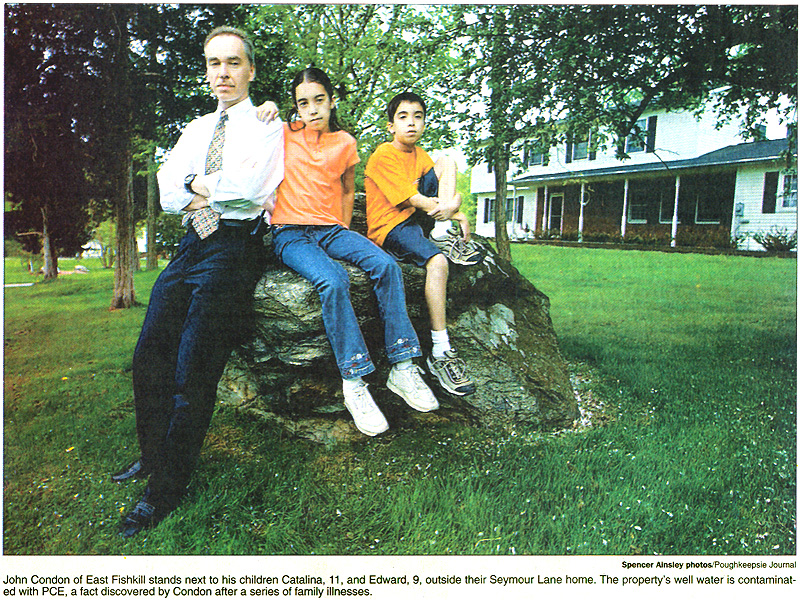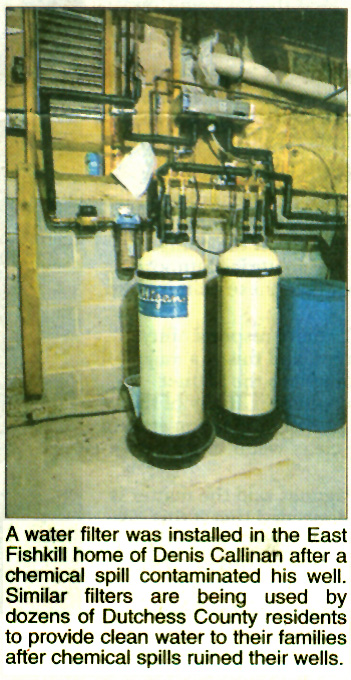

Sunday, July 13, 2003
Well testing ignored at great price

John Condon sensed something was wrong the winter his family kept getting sick.
His 11-year-old daughter, Catalina, came down with pneumonia. His son Edward, 9, suffered from asthma worse than before. Condon, rarely ill himself, had a nagging sinus infection.
After hearing that the water at a nearby recreational center was polluted, Condon did what anyone with a well should do: He got his water tested. Condon found he and dozens of his neighbors have been drinking contaminated water for years.
Too few people with private water wells bother to check -- and government is missing a vital opportunity to make sure more homes are tested.
This has to change if Dutchess County is going to stop the spread of chemical spills that get into drinking water supplies.
The contamination is so bad in Condon's Shenandoah neighborhood of East Fishkill that the area has been declared a federal Superfund site.
The main pollutant is PCE, or tetrachlorothylene, which court records show was dumped by a contractor hired by IBM in the 1960s and 1970s.
PCE exposure has been linked to serious health problems, including cancer, but the risks from drinking PCE-tainted water are not yet known. Aside from what Condon has observed, Shenandoah residents have cited illnesses, ranging from developing skin rashes to suffering from clinical depression.
The contractor, Jack Manne Inc., used PCE to clean IBM microchip racks at a nearby site on East Hook Cross Road, according to court records. Workers then disposed of the chemical by allowing it to drain through a septic system -- from which, Environmental Protection Agency officials conclude, it leached into the neighborhood's groundwater.
PCE breaks down naturally into TCE, or trichloroethylene. TCE has been detected in more than 40 wells; PCE is in about 65 wells.
Most pollutants that get into water are maddeningly difficult to track -- they are colorless, odorless and often spread as fast as water.
And it's not just up to residents to stop these health hazards from spreading. Government needs to get more deeply involved. New Jersey, for example, requires a thorough well water test whenever a home is sold. The test covers not only a wide range of bacteria, but many dangerous compounds, including PCE and MTBE, or methyl tertiary butyl ether, a gasoline additive that has contaminated wells in Hyde Park's Greenbush area.
The New Jersey law took effect in September. Of the 1,082 homes that have undergone the more extensive testing, 300 have failed the state's water quality standards. The buyer and the seller are free to negotiate a remedy, if one is desired. Installing water filters has alleviated most of the problems, said Fred Mumford, spokesman for the New Jersey Department of Environmental Protection.
The new law is going into effect gradually and, by next year, it will also mandate that landlords test their wells and share that information with their tenants within a month of receiving the results.
Push for New York protection
Some 750 Dutchess residents have signed a petition asking for a similar law here, but county lawmakers have not shown the vision to pass it.
"I think they are afraid of what they might find," Condon said.
The health risks are too great for lawmakers to wait -- and the costs of more cleanups will only grow. For example, the EPA has recently confirmed it has found pollution in the drinking water of 28 more homes a few miles north of Shenandoah. This is in connection with an unrelated TCE spill, and the polluter has not yet been determined.
Debra Hall, who along with her husband, David, purchased a house in this area only two years ago, said, "I want there to be a law ... that if you are buying a home, you have to have your water tested, because my whole life changed when that call came from the EPA." Ideally, the state should set this water-testing requirement, so there's one clear standard across New York, but sometimes the counties need to lead the charge to change.
Shenandoah residents, in fact, have been frustrated by the slow response of the county and state health departments. They say the county referred the matter to the state which, in turn, took too long testing wells -- and getting the results back. They say once the severity of the problem was realized and the federal government claimed the area a Superfund site, the response has been much better.
They particularly credit U.S. Rep. Sue Kelly, R-Katonah, for tenaciously working on their behalf.
The water in the polluted wells is now being filtered. Still, residents have been told by health officials they have an increased risk of cancer and other ailments because they were exposed to one or both chemicals for years before the problem was discovered by Condon in winter 2000.
IBM has at least stepped forward to join the cleanup effort. There's little point for EPA officials to pursue the contractor. Jack Manne Inc. is defunct, and its principal, Jack Manne, is now in his 90s and living in Manhattan. He has told the Poughkeepsie Journal he doesn't remember any details.
But, in a deposition taken by the EPA, Louis Sartori, who worked for Manne between 1968 and 1974, outlined in detail how the contract business washed the racks on a daily basis and delivered them to IBM's East Fishkill facility.
Pursue water options
IBM and federal officials are now evaluating the options to bring clean water to the residents, including:
- Drilling new local wells.
- Hooking up to the water line that will run through central Dutchess along the old Maybrook railroad bed.
- Connecting to the private Four Seasons water supply on East Hook Cross Road.
- Latching on to the Town of Fishkill water system from the Snook Road property.
Once the system is installed, residents will have to pay for the water, though there is nothing preventing the homeowners from filing individual civil cases against the polluters to get damages. Such court cases, while necessary, can be lengthy and expensive. And it's not always easy to identify the polluters. Residents using private wells must realize illegal dumping of chemicals was commonplace in decades past, and it still occurs today. They should get their wells tested to make sure they are safe.
If pollution is found, the government must go after the responsible parties with zeal. And when homes change ownership, the government should mandate that both buyers and sellers be made aware of how safe the water is.
Relevant Web links
- To find out more about New Jersey's water testing program, go to the Web site: www.state.nj.us/dep/pwta
- To read more about EPA's monitoring of the Shenandoah area Superfund site, go to the Web site: www.epa.gov/Region2/superfund/npl/0204269c.htm
What you can do: Homeowners wanting to have their drinking water tested should consult with state-approved private laboratory. Tests generally range from $150 to $300, depending on how comprehensive they are. A list of such labs can be found in the Yellow Pages under "laboratories." Or you can call the Dutchess County Department of Health at (845) 486-3404. The department does not perform these tests but can provide information about them.



| Back to index |
| Watershed Home | Media Menu |